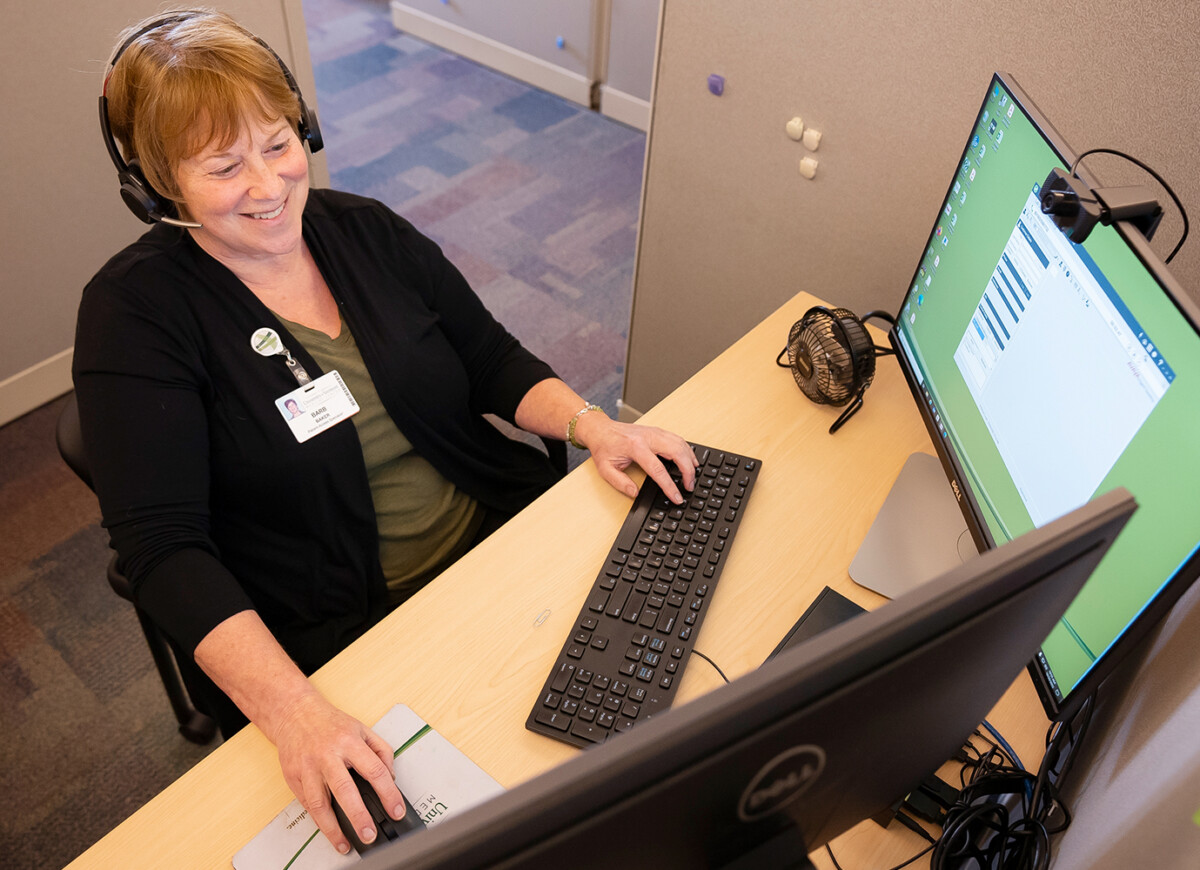Improving Access, One Patient at a Time

When Barb Baker first spoke with her patient, he was still in tough shape from a fall. He had broken his ankle and nearly knocked himself unconscious, and a CT scan to assess the extent of the damage had revealed something unexpected: A large nodule, or lump, on the patient’s thyroid.
The nodule was not related to the injury that brought him to the hospital, but only a biopsy and the expertise of an endocrinologist would be able to determine whether the nodule was harmless or malignant. “He was really stressed about having to wait for another appointment with a specialist to understand what was really going on,” says Baker, a patient access specialist with the University of Vermont Health Network Patient Access Service Center (PASC). “Understandably, he was being proactive about his health. He wasn’t content waiting to see that specialist.”
As she does every day, Baker combed through the schedules of endocrinologists across the UVM Health Network, looking for a cancellation or last-minute opening, anything to get her patient seen more quickly. Finally, she saw it: an appointment with an endocrinologist at The University of Vermont Medical Center the very next day. Although it meant traveling across the lake from Plattsburgh, her patient jumped at the opportunity, expressing relief that he could quickly speak with his doctor and understand all of his options.
We know people are frustrated by the wait times. I want them to know that ‘we hear you’ and that there is a group of us doing everything we can to get you appointments sooner and more easily.
Barb Baker
Reducing Wait Times
Launched in 2021, the PASC is designed to make it easier for patients to schedule appointments. It is comprised of more than 80 team members, each one dedicated to scheduling appointments for patients across a variety of specialties and services across the UVM Health Network. From their central vantage point, PASC staff members root out and fill gaps in specialists’ schedules and keep tabs on wait lists so they can notify people of earlier opportunities to see their health care provider.
“Our team is singularly focused on shrinking the length of time it takes for our patients to see a health care provider,” says Jayne McCauliff, manager of the PASC.
When loved ones are in pain, any wait can feel like an eternity, a feeling all too familiar to Marylou and John Williams. Surveying hospitals in southern Vermont over the course of several months, the pair tried unsuccessfully to get Marylou seen by a specialist for the increasing pain she felt in her hands and knees.
“It was a really frustrating and tough ordeal to go through, especially for my wife,” says John Williams. “It’s hard to watch your wife struggle with pain like that and not be able to make any headway with her appointment.”
Ultimately, Marylou Williams’s physician encouraged her to try her luck farther north, at the UVM Medical Center. When John Williams called to schedule an appointment, he spoke with Joe Colasurdo, a patient access specialist at the PASC, and the couple finally started to get some traction.
I try to put myself in other people’s shoes. At the end of the day, we are all patients – I know what it’s like to need a doctor’s visit, so my sole mission is to try to help people like Marylou and John get an appointment as quickly as possible.
Joe Colasurdo
It paid off. Marylou Williams saw a specialist about a week later, and her pain is subsiding with the help of a new medication. For his part, John Williams wants other patients to know that they can play a role in helping others get care more quickly.
“If you’ve got a specialist appointment and need to cancel, do it well in advance,” he says. “At least that gives someone else a chance to get scheduled in time.”
Giving Patients a Choice
One of the benefits of the PASC’s central scheduling system is that it takes advantage of fluctuations in the demand and supply of a given health care service across UVM Health Network’s different hospitals and clinics. If patients face a long wait for an appointment at one location, the PASC can often schedule patients faster for the same appointment at a different Network location.
COVID-19 and workforce shortages have made it really difficult to keep pace with the growing health needs of communities, and unfortunately you often see this in the longer-than-usual wait times for certain specialties. The PASC team provides options to our patients, helping them to decide which dates and location works best for them. Scheduling across multiple hospitals opens up access that the patient may not be aware of.
Jayne McCauliff
The PASC does not manage scheduling for the entire UVM Health Network, but it is making inroads where it is active. For example, after the PASC took the lead in scheduling urology appointments, hundreds of people waitlisted for care at the UVM Medical Center were seen more quickly at UVM Health Network – Central Vermont Medical Center. In similar fashion, PASC involvement in pulmonology scheduling created more than a thousand new openings for appointments at UVM Medical Center for patients that would have otherwise been scheduled for the pulmonology department at UVM Health Network – Champlain Valley Physicians Hospital. Similar progress is being made elsewhere, in specialties like cardiology, rheumatology and endocrinology.
“We can’t fix this challenge overnight,” says Baker. “But we’re making progress, one patient at a time.”
